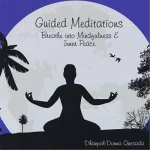Mojo, as popularized in the Austin Powers movies, is defined in the Urban Dictionary, as The ability to bounce back from a debilitating trauma and negative attitude. This is how I think of it, as well.
One of my students recently found herself in a funk (depressed mood). She asked me if I ever find myself in this sort of situation. Of course! She then asked me if I have any tricks. Of course! And that is the only difference.
Here I share my top five:
1. Before getting out of bed in the morning, do 1-3 minutes of Breath of Fire. This is a powerful breathing technique used in the form of Yoga that I teach. Among a long list of benefits, it not only balances the nervous system, but very effectively oxygenates the system, which is vital in kick-starting your body’s natural healing mechanism. Your body responds to this boost of vitality both physically and psychologically. Doctors who recognize the interconnectedness of mind and body stress the importance of breathing in the healing process. An example is Dr. Sarno, who cites oxygen deprivation as a prime cause of what he calls mind-body disorders. Whether the roots of your funk are psychological or physical, the Yogis have known about the power of breath for thousands of years. As an aside, film buffs will remember the scene, in Harold and Maude, in which the full-of-life Maude tells Harold to “greet each dawn with a breath of fire.”
*Here’s how to do it: (Remember, do this before getting out of bed!) Begin panting like a dog. Notice how the inhales and exhales are of equal duration. Notice also, how the “pumping action” comes from the belly. These are the proper mechanics of it. Now, close your mouth and continue on through the nose. This is Breath of Fire!
(To make it even more powerful, lift your legs and head six inches off the mattress while you do breath of fire for at least one minute. This gets easier with time!)
2. Super Food! 38.00 for magic-in-a-bottle. I’m lucky to live five minutes from Dr. Schulze’s famous warehouse, but they ship anywhere—and people fighting illnesses of all sorts use this product. (Note: I have no stock in this company!)
If you have a juicer, add a scoop of this green powder to freshly juiced spinach, apple and lemon. The super-trick is to make sure you drink it first thing in the morning, on an empty stomach, so that it goes straight to your bloodstream and to your cells. If you don’t have a juicer, add a scoop to a glass of water with freshly squeezed lemon, or shake it up in a bottle of apple juice or V8. Remember: on an empty stomach! Wait a half hour before eating.
3. Take a half-hour walk, first thing in the morning, before eating. The earlier, the better—preferably at the break of day when the street lamps are still lit. This rejuvenates psychologically, as well as physically. You are drawing on your own prana, or, life-force, free from the weight of digestion. Similar to the mechanism of homeopathy, this has the effect of stimulating your own inner power. On a subconscious level, you understand that you are capable of waking up your own inner vitality.
4. Switch to the heart-perspective. This has been an enormously important element in my own journey. What does this mean to you? If the funk has come about because of physical illness, how might the heart-perspective facilitate healing? This is subtle, but unspeakably powerful. It may be a simple matter of letting go of the inner fight against your physical body. And letting go of the fight allows healing. The inner acceptance of the time needed to heal, allows healing. In the case of mental disturbances, for example, an exchange with an irritating person, it may mean reminding yourself of how trivial the situation is, in comparison to worldly issues, or reminding yourself that the offensive action was done out of ignorance and not out of intent to provoke. Both perspectives engender forgiveness, and ultimately, healing.
5. Pray. This is like supercharging the heart-perspective. It took me a long time to fully appreciate the power of prayer. Especially “nondirected prayer,” which invokes the natural healing ability of surrender, and ultimately brings about an “inner unburdening” (and gives you back your mojo!) Here’s a little something about this from one of the teachers in my tradition, Dr. Dharma Singh Khalsa:
One of the most potent forms of the mind-power effect is the type of prayer called nondirected prayer. In nondirected prayer, there is no request for a specific outcome. Instead, the person who prays focuses on the feeling that things happen for the best, and focuses upon his or her desire to see events unfold naturally, according to the benign flow of the universe.
Hence, it doesn’t matter to whom you pray. You are attuning yourself to the higher powers that be and to your own higher consciousness, which is the ultimate perspective changer. After all, as the Yogis also say, it’s all maya! Just a dance and none of it is as serious as we make it out to be. This enables a true liberation.
And don’t get stuck on the word desire in the quote above. They’re made out to be terrible things, but it depends on what kind and how we’re able to direct them.










